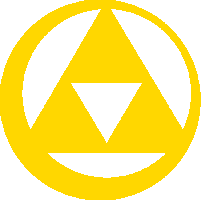The Minish,[2] also known as Picori by the Hylians,[2] are a small race of people no bigger than Link's thumb that appear in The Minish Cap. Ezlo and Vaati were once Minish too.
Characteristics[]
The Minish resemble anthropomorphic mice that, like Hylians, have long, pointed ears. They came from the Minish Realm long ago, when monsters threatened mankind, and gave the Hero of Men a Sword of unparalleled power: the Picori Blade. They also left behind the Light Force or Golden Light for the Royal Family. Their help is celebrated annually in Hyrule through the Picori Festival. Every one hundred years, the Minish Door, a doorway between their world and the world of men, appears in the courtyard of Hyrule Castle.
It is said that Minish are invisible to adults; only good, well-behaved children can see them.[3] The Minish are well-known for their Kinstone hiding capabilities. Wanting their human counterparts to find them, they place them in various obvious and inconspicuous places, and even keep some for themselves to Fuse Kinstones with Link when he comes along.
Their language is slightly different from that of the Minish Realm and they do not understand the Hylian language.[2]
Types of Minish[]
Forest Picori[]
The Forest Picori are the Minish that live in the Minish Woods, and throughout Hyrule Field.
Mountain Minish[]
The Mountain Minish are seven Minish that followed Melari from the Minish Woods to Mount Crenel.
Town Minish[]
The Town Minish are the Minish that moved from the Minish Village to Hyrule Town due to their love for Humans.
Trivia[]
- Other name ideas for the Minish included "Chilorians" and "Tiny People".[4]
- Whereas the Minish are known as Picori to Humans in the English version of the game, the other language versions do not actually feature such a distinction and have Minish and Humans using the same word.
- The Japanese, German, French and Italian versions of the game have the Minish speak in reverse. This trait was kept in the English release of The Minish Cap manga by Akira Himekawa, although with a different font than normal.
- The Minish appear to be based on the Koro-pok-guru of Ainu folklore. Likewise, the Town Minish are reminiscent of the Brownies from Scottish folklore and the German Heinzelmännchen.
- Breath of the Wild was originally planned to feature small people as well, with Link even shrinking down to interact with them. While they are not specifically identified as Minish, the video where this is revealed does show footage from The Minish Cap during the discussion.[5]
Nomenclature[]
| Language | Name | ||
|---|---|---|---|
| Japanese | ピッコル (Pikkoru)[6] | ||
| Dutch | Minish[7] | ||
| FrenchEU | Minish[8] | ||
| German | Minish[9] | ||
| Italian | Minish[10] | ||
| SpanishEU | Minish[11] | ||
| This table was generated using translation pages. To request an addition, please contact a staff member with a reference. | |||
Gallery[]
References
- ↑ "You can use the power of the Minish Cap to get small, unlock clues, and save Hyrule." — The Legend of Zelda: The Minish Cap US commercial, YouTube (Video), retrieved October 24, 2014.
- ↑ 2.0 2.1 2.2 2.3 Encyclopedia, Dark Horse Books, pg. 52
- ↑ "No, soldiers will not do. The Picori do not show themselves to anyone but children. Our soldiers could search for days and still find no sign of them." — King Daltus (The Minish Cap)
- ↑ Encyclopedia, Dark Horse Books, pg. 273
- ↑ "For example, we had this idea of including tiny people. Since this is a 3D game, we could have all these tiny-sized towns, and Link himself could shrink." — The Making of The Legend of Zelda: Breath of the Wild Video – Story and Characters, YouTube (video), published March 14, 2017, retrieved March 14, 2017.
- ↑ Nintendo Official Guidebook—The Legend of Zelda: The Minish Cap (Shogakukan) pg. 145
- ↑ The Minish Cap manual, pg. 64
- ↑ The Minish Cap manual, pg. 44
- ↑ Encyclopedia (TOKYOPOP) pg. 270
- ↑ Encyclopedia (Magazzini Salani) pg. 270
- ↑ Encyclopedia (Norma Editorial) pg. 270


